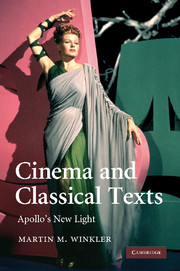Book contents
- Frontmatter
- Contents
- List of illustrations
- Acknowledgments
- ΦΟΙΒΩΙ ΑΠΟΛΛΩΝΙ ΦΩΤΟΚΙΝΗΤΗΙ
- Introduction: The god of light and the cinema eye
- 1 A certain tendency in classical philology
- 2 Divine epiphanies: Apollo and the Muses
- 3 The complexities of Oedipus
- 4 Patriotism and war: “Sweet and fitting it is to die for one's country”
- 5 Helen of Troy: Marriage and adultery according to Hollywood
- 6 Women in love
- Epilogue: “Bright shines the light”
- Bibliography
- Index
Introduction: The god of light and the cinema eye
Published online by Cambridge University Press: 18 August 2009
- Frontmatter
- Contents
- List of illustrations
- Acknowledgments
- ΦΟΙΒΩΙ ΑΠΟΛΛΩΝΙ ΦΩΤΟΚΙΝΗΤΗΙ
- Introduction: The god of light and the cinema eye
- 1 A certain tendency in classical philology
- 2 Divine epiphanies: Apollo and the Muses
- 3 The complexities of Oedipus
- 4 Patriotism and war: “Sweet and fitting it is to die for one's country”
- 5 Helen of Troy: Marriage and adultery according to Hollywood
- 6 Women in love
- Epilogue: “Bright shines the light”
- Bibliography
- Index
Summary
To the ancient Greeks and Romans Apollo was the patron of arts and sciences like music, poetry, medicine, and prophecy. Apollo also came to be the god of light, literally in his identification with the sun and figuratively as bringer of culture and enlightenment. His most common epithet attests to his essence: Phoibos or Phoebus (“Shining, Brilliant”). The word expressed the god's nature so well that the ancients came to regard it as practically a second name. As representative of civilization Apollo was also the Mousagetês, the leader of the nine Muses, his half-sisters who were themselves guardians of arts and sciences. Apollo's half-sister Athena – Minerva to the Romans – was associated with culture and the arts as well.
Apollo is the first god to make a personal appearance in the history of classical literature. At the opening of Homer's Iliad he brings a devastating plague upon the camp of the Greeks by means of his far-reaching arrows. The first Homeric epithet for Apollo is therefore hekêbolos: “hitting his mark” but subsequently understood to mean “hitting from afar.” Related to this word is another adjective frequently found in Homer and later authors to characterize Apollo: hekaergos – “working from afar.”
For the purpose of the present book the meaning of this latter term will be understood beyond the range that was open to the ancients. The reach of Apollo as god of light exceeds that of Apollo the archer.
- Type
- Chapter
- Information
- Cinema and Classical TextsApollo's New Light, pp. 1 - 19Publisher: Cambridge University PressPrint publication year: 2009



